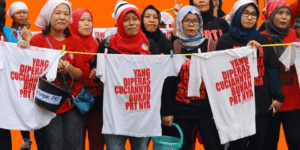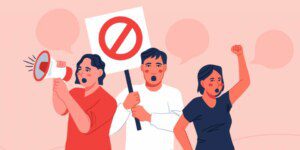1.Yuyun’s story, Transwoman
The family, which was supposed to be a safe place, was far from what Yuyun (not her real name) expected.
Her parents and other family members rejected Yuyun after admitting she was a trans woman (Transgender Male to Female).
“I was born as twins, all male, but I feel my gender is female. That’s why from a young age I felt that I was a woman; it’s just that the family, especially my father, did not justify my expression like that (feminine),” said Yuyun behind a WhatsApp video call conversation on June 21, 2022.
The family expresses their rejection in various forms of violence. Being beaten, bullied, and even undergoing spiritual rituals had been accepted by Yuyun. The family that Yuyun hoped to be a shelter, a place to ask for help in trouble, and a place to find love and happiness, turned out to be an uncomfortable place for her.
“Because my parents rejected my expression, especially my father and brothers, I was beaten, kicked several times, and even dragged while being watched by neighbors. They said it would be disastrous for the family if I became a muzzle,” recalled Yuyun, who couldn’t hold back the tears.
Yuyun often doesn’t get appreciation and support from her parents even though she achieved several achievements while attending school. She was even limited to parents’ presence when distributing educational report cards at the end of the semester.
“When I remember that, I will cry because my friends’ parents all came, and I was the one who didn’t, even though at that time I was able to rank at school,” she recalled, wiping away the tears that kept falling.
Because her family couldn’t accept Yuyun as a transwoman, her parents forced her to undergo ruqyah, known as Islamic exorcism, a spiritual ritual to expel evil spirits from within her body. Her father believed that the evil spirits were the cause of his son becoming a trans woman.
He then performed this spiritual ritual on Yuyun many times, but it didn’t make her a masculine man. Not satisfied with the ruqyah, her parents then forced Yuyun to enter the Islamic boarding school, until finally, the family gave up because Yuyun still had a feminine expression.
“I told my father that I would go to ruqyah so that when I entered the Islamic boarding school, my expression would not change as a woman because it was not an evil spirit. I felt it from within me, but because of my resistance, I got harsh treatment. They beat me, threw away all my clothes, even kicked me out of the house,” repeated Yuyun.
2. Icha’s story, Transwoman
The story of Yuyun, who experienced violence due to rejection, was also felt by Icha (not her real name). As a survivor of violence, recovering from past trauma is difficult. Glassy eyes and lips that still tremble when speaking show that the trauma of the violence is still real before our eyes.
“I still remember how my mother hit me for the first time just because she didn’t accept me as a woman who looks masculine (tomboy) and likes women (lesbian). If I remember that, my body is still weak, and my chest hurts,” said Icha in a hoarse tone.
Moreover, Icha was 29 years old at that time. At that age, a person enters the adult phase, where she should be able to be given choices about her life instead of providing memories and memories full of fear.
“My family rejected me because they considered it violated the culture and norms as a woman that my family understands to this day,” she recalls.
Icha admits that her family refers to her as a child who brings bad luck (cilaka). She is also commonly accused of being an unclear child (between a boy and a girl). The parents and family members also obtained this labeling.
“Not to mention that in my name, there is a family clan that is considered respected and respectable, so I am required to protect it according to the customs and culture that exist in my family,” Icha recalled.
After that, Icha experienced even more challenging conditions when she became a victim of forced marriage. Today’s heteronormative society sees marriage as a form of proof that she is someone who is considered “normal.”
“I had to marry a masculine man, he said, that would be a way out so that I could express myself more feminine and could be attracted to men so that I would no longer be a lesbian. Even though I can’t deny that I am a woman interested in and likes women,” Icha emphasized.
3. Rizal’s story, Gay
Violence and criticism from the family are not only felt by transwomen and lesbians. Rizal (a pseudonym) also felthis family rejects him as gay.
Pressure, abuse, and stigma from the family and the absence of a parental protective role made him afraid to meet the family.
“I even got physical violence from my family and parents because I was gay. They refused me to be gay, and my family considers me to tarnish the family and bring shame to them,” he said.
Most of Rizal’s family also no longer provides love and attention, like before he discovered he was gay. He admits that he likes and is attracted to fellow men, not part of coercion.
“My father beat me because they were ashamed that I grew up as someone considered abnormal. Moreover, the pressure from my extended family because they considered my choice was a mistake among the people,” said Rizal.
4. Kasma’s story, Transwoman
The stigma attached to this LGBT group brought fear and inner turmoil to Kasma (a pseudonym). Her parents forced her to cover up her gender identity as a trans woman and extended family. Even now at the age of 53 years.
She chose this decision as a form of maintaining the honor of her parents and family. Even though at first, she felt it was hard because she had to dress and express herself like a masculine man in general.
“Whenever my parents see a bean (transgender), they tell their sons not to be like them. Because it will bring shame to the family because it is not normal,” said Kasma.
It also scared her because if she confessed herself openly, she was sure that her family would not accept her. Even though Kasma found herself as a woman, she has felt since attending elementary school level.
“Including all of my siblings, no one agrees if any of their family members do that (becoming a waria). So I shut myself off. Moreover, my family has threatened me to be expelled as a family member if I violate it, so I’m afraid of being ostracized,” admitted Kasma.
Even though Kasma, in her daily life, wears clothes like those worn by masculine men, she still believes that she is still a woman. Kasma only wears feminine clothes and dresses when she is far from where she lives because she is afraid and feels uncomfortable whenever her family sees her.
“At first, it was hard because I wanted to express myself like a woman, but I just did this because I was afraid of my family. I am also old, so I feel that it is not clothes that indicate I am a woman or a man, but how I recognize myself,” said Kasma.
5. Miranda’s story, Transwoman
Miranda (not her real name) experienced threats from the police. The expulsion from a group of people occurred in 2018 at her own house in Gowa Regency, one of the areas in South Sulawesi Province.
“The authorities once threatened me with shooting when I was evicted from my own house because I am a trans woman,” recalls Miranda with a deep breath.
A group of residents, police officers, and local officials expelled her on the pretext that she freely allowed guests (her spouse) to live together, and according to them, this was not normal even though it was in his own private house.
“My right to privacy is free to be taken away. While I have never committed a crime and seized the rights of others,” said Miranda.
A group of people without a permit arbitrarily broke into Miranda’s house and ransacked the place. They checked almost all parts of the house. They examined the contents of the cupboards, beds, and everything that was suspected.
“I don’t know the reason. They ransacked my house and examined the entire contents of the house. I also don’t know what they are looking for,” explained Miranda, haltingly remembering that sad moment again.
When that happened, Miranda tried to fight back by asking for a permit from one of the officers to ensure that their actions were official or only initiated by those whom people judged to dislike her. The result was not the inspection permit that Miranda received. She was bullied and threatened with shooting if she resisted.
“I asked for a permit, right? Then one of the magistrates’ officers immediately snapped at me and said don’t mess around here. I shot him,” she confessed.
She experienced another forced eviction in 2021. It happened at her grandmother’s house in a housing estate in Makassar City. The reason was that residents rejected Miranda because they shared a place with their partner.
“They judged what I did was unlawful and could bring disaster and bad luck. Even though I had assured them that my partner was only coming to rest, it would not take long, and at that time, I was not alone, but there were several people,” she said.
Rejection in Schools, the World of Work, and Houses of Worship
The rejection of the community environment is also a bitter memory still recorded in Icha’s memory. In junior high school, she had pretty extraordinary differences from his school friends and teachers.
When a feminine friend makes a mistake, for example, she only gets gentle treatment as a punishment for the error, but if the culprit is herself, she is given a harsh sentence because she is considered a man.
In the world of work, she is also not spared from acts of discrimination and the stigma often attached to her. Government agencies and even the university where she used to work have a regulation on how employees dress, so this rule closes space for her as a woman with a masculine expression.
“I used to work in a government agency but chose to leave because I was uncomfortable. They forced me to express myself femininely while I was uncomfortable doing that,” explained Icha.
In society, someone with a lesbian is still a thing that is rejected and prone to vigilante acts. Like Miranda’s experience of being evicted from her own house, Icha also experienced being expelled at her rented house in Makassar, even though the expulsion was not based on evidence, only assumptions.
“I was slandered by unscrupulous religious leaders who did daily activities around my rented house. He alleged that I often brought my partner and others while I kept my passing secret from the people around me. I didn’t just invite people to my rented house,” he said.
Yuyun also felt the same way. She even experienced violence and bullying at the house of worship. Where should these places of worship be the safest for all individuals of various genders?
At that time, Yuyun was about to perform the tarawih prayer in the congregation when a friend pelted her at the mosque. Even when she was praying, that one friend pulled her prayer mat, and Yuyun was pushed out of the saf. Yuyun did not report this treatment to her parents because she was sure that she would not be defended by anyone, especially since, at that time, the culprit was a child from an influential family in the village.
“I finally fought. I asked why is that, and he just replied that you don’t need to pray because if the transgender (transgender) prayer was not accepted so, he said it was useless. In the end, I was afraid to go to the mosque,” he recalls.
The stigma of Bringing Jinx and Violating Norms Becomes Fear of Expression
Diversity activist Ainun Jamilah said that with its diversity, Indonesia had been injured by discrimination from powerful groups to vulnerable groups. This condition indicates that the value of diversity has shifted at this time.
“Indonesia has been diverse since we were born. Several years ago, people grew up seeing that diversity. It’s just that currently, there is a shift so that some people are taboo again and are surprised to interpret diversity itself,” she said.
Most people today are more antipathetic than empathetic to groups beyond their understanding of values and expressions. Thus giving birth to a society that is arrogant in responding to differences in terms of religious values, and ethnicity. Especially if it’s different in terms of gender and sexual expression.
“I see this as part of the arrogance of identity, feeling that he is in the majority, so he feels he is right if he punishes people he doesn’t like. This is then implemented through acts of violence, such as hate speech, hitting, persecution, and other forms of violence,” she explained.
The sexual minority group or LGBT, for example, are seen as an anti-god group to the extent that they are associated with the phenomenon of natural disasters, which of course, has no connection and no relevant relationship. Because she believes that this sexual minority group is a human individual who is the same as other humans, before the state, and social life, should have the same rights and position.
“When we talk about those different from us regarding gender and sexual expression, we should not immediately bring up black or white, halal or haram, right or wrong. But looking at the context is good and evil. As long as they do good, then it’s good, and whoever it is, regardless of class, expression, and others, we should be able to accept it, “said the Founder of the Cute Line Veil Community.
Chairman of the Ta’lif wan Nasyr Nahdlatul Ulama Institute (LTNNU) of South Sulawesi Syamsurijal said Islam had recognized diversity since the beginning, which has been sunnatullah and has also been clarified in several verses of the Quran.
So this is one of the basic foundations showing that Islam recognizes that diversity is a nature determined by God. If you reject diversity, it means contradicting God’s provision and rejecting sunnatullah.
Acceptance of diversity, according to Rijal, is carried out by opening oneself up to meet, communicate and dialogue with groups outside of groups who feel justified.
“Because this is sunnatullah, everyone must accept it. The difference doesn’t have to be because you feel different, so you don’t want to meet other groups. That’s not a trait explained in Islam,” he said.
Then if that diversity is seen in the context of gender differences or sexual minorities, people should no longer look at the stories of Prophet Lut. Some scholars have seen this more reasonably by seeing them as human beings. So religious groups should see them as human beings with the right to life, the right to associate and assemble, the right to get a decent education and job, and the right to receive all public service facilities fairly.
“Islam provides rights to life for minority groups such as LGBT, disabled, religious minorities, and other vulnerable groups. In Islam, their rights are still recognized in society, “explained Rijal.
He believes that not only sexual minority groups are experiencing marginalization, discrimination, and acts of violence at this time. Local communities and minority religious groups also share the same condition. This is due to the emergence of certain religious groups which are very conservative, while this conservative nature is not only in their views but actualized in their actions, so that cannot be justified.
“If at a certain level the thoughts are conservative, it’s not a problem, but this is followed by actions such as hate speech against people who are different from themselves, and there is no violence against groups, there is even a ban, now this is the problem,” he continued.
Struggle to Assert Yourself Until Openly Accepted
Accepting LGBT people openly in the family is not like turning the palm. Proving and being yourself becomes a struggle for them against all forms of rejection.
Yuyun was forced to decide to get out of her hometown. This decision was due to a threat that haunted her, especially when she entered adulthood around 2009; she felt criticism and rejection from society. Moreover, at that time, there was the disbandment of transgender person activities in their area in Bulukumba Regency for the first time.
“I “threw myself away” to Surabaya, where I wanted to prove that I could earn lawful money with my identity. Finally, from the results of my work overseas, I was able to send my mother for the necessities of life, even my father’s medical expenses, without them knowing it was from me,” she recalled.
After her parents found out that all this time, living expenses came from their trans woman in a foreign country, her parents then opened themselves up to accept Yuyun as a boy with a woman’s expression. When her father died, her siblings rejected his identity again. As a result of this rejection, she did not get inheritance rights because she did not become like the child her parents wanted and was considered to have violated the morals taught by herparents.
“Not only my family, when I decided to return to my village, but I also started a business by opening a salon. But my relatives and neighbors damaged my salon, so I finally decided to go abroad again, until finally I returned to my hometown and was openly accepted by the community,” said Yuyun.
They were being accepted as gay is not easy for Rizal. He is slowly proving to himself that being gay doesn’t make people wrong.
“I have proven that my identity as a gay person does not make the family’s image worse. So that gradually my family, including my parents, can accept me as a boy who likes and is interested in men,” said Rizal.
The State Still Ignores Sexual and Gender Minority Groups Survivors of Violence
Coordinator of the Makassar KSM Case Advocacy and Assistance Division, Echa Lareyzha, admitted that the process of advocating and assisting transgender victims of violence and other LGBT groups still needs to be maximized. There are still many obstacles that need to be noted to be considered, for example, the need for a safe house for them.
“Including that there is no safe room for victims of violence from the LGBT group. While we feel this is also important for them, because we are not only focused on resolving cases, for example, how perpetrators can be prosecuted by the law and others, but also pay attention to the rights of victims that they need,” he explained.
This also includes the case assistance process. If the case is over, usually, the victim is no longer accompanied in the form of strengthening and trauma recovery. This is, of course, due to the absence of psychologist services that are friendly to LGBT people, especially transwomen, so this is still a big obstacle today.
Based on the Year End Records (Catahu) summarized by the Sehati Makassar Community from 2007 to 2022, there were 45 cases with a total of 1,507 victims or 23 cases individually and 12 cases as a group or community. Then, out of the total recorded cases, 27 percent were cases of physical violence, 50 percent were cases of psychological violence, 2 percent were cases of sexual violence, and 22 percent were cases of economic violence. In these cases of violence against LGBT people, trans women are the victims who experience the most violence.
Meanwhile, the patterns of violence that existed varied. Among other things, 33 percent intimidation, 13 percent disbandment of activities, 13 percent persecution, 10 percent expulsion, 10 percent torture, 6 percent cancellation of permits, and 2 percent are other forms of patterns that discriminate.
Echa explained that the condition of perpetrators of violence against LGBT people has also shifted from year to year. Based on data for 2007 to 2019, the biggest perpetrators of violence were the state at 17.42 percent, communities or groups and community organizations at 48 percent, and individuals at 4.10 percent. Then in the period 2020 until now, the trend has changed where the biggest perpetrators of violence are community groups or organizations.
The State Has Not Yet Performed Its Obligation to Protect Minority Groups
The state has guaranteed the right to life and expression for the people. This guarantee is contained in Law (UU) No. 39 of 1999 concerning Human Rights. Not to mention Article 28A of the 1945 Constitution, which reads, “Every person has the right to live, and has the right to defend his life and existence.”
The existence of state guarantees related to protection for the community still ignores guarantees of protection for vulnerable groups. Such as gender and sexual minority groups. This is proven by the fact that the state, through the state apparatus, is still the perpetrator of discrimination and violence against minority groups. Meanwhile, the government should prioritize protection for them.
“They (the government) must protect this minority group. Sexuality minorities, local community groups, religious minorities, and other vulnerable groups. Because in a democratic country like this, we cannot ban the existence of one group,” said Syamsurijal.
Special regulations related to protecting this vulnerable group should be needed because the prohibition government officials have carried out against their group until now has been considered wrong. What should be seen in the portion of the ban is if this minority group undermines several main things—among other things, undermining stability and morale.
“What they did and got banned was not in that context, but in the context of their freedom of expression and other living spaces. It is wrong,” he said.
Not to mention those assumed to be violations by minority groups such as LGBT groups, the state apparatus should have resolved them through a fair legal process. Therefore, coercion, persecution, and other forms of violence are not justified without going through fair legal procedures.
“The protection rules or policies for these vulnerable groups certainly aim to protect them and can also be a bridge in dealing with issues of differences in values and expressions in society. So it is vital to pay attention to the state in resolving discrimination against these vulnerable and minority groups,” said Rijal.
(Illustration photo is the original work of Muhammad Irham: A sweet man who likes to drink green tea)
This coverage is part of the Mainstream Press Workshop and Story Grant program organized by the Union of Journalists for Diversity (SEJUK) in collaboration with the Norwegian Embassy for Indonesia.
(Translated by: Marina Nasution)













